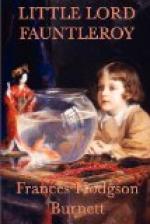It had not displeased the Earl to find that the mother of his heir had a beautiful young face and looked as much like a lady as if she had been a duchess; and in one way it did not displease him to know that she was popular and beloved by the poor. And yet he was often conscious of a hard, jealous pang when he saw how she filled her child’s heart and how the boy clung to her as his best beloved. The old man would have desired to stand first himself and have no rival.
That same morning he drew up his horse on an elevated point of the moor over which they rode, and made a gesture with his whip, over the broad, beautiful landscape spread before them.
“Do you know that all that land belongs to me?” he said to Fauntleroy.
“Does it?” answered Fauntleroy. “How much it is to belong to one person, and how beautiful!”
“Do you know that some day it will all belong to you—that and a great deal more?”
“To me!” exclaimed Fauntleroy in rather an awe-stricken voice. “When?”
“When I am dead,” his grandfather answered.
“Then I don’t want it,” said Fauntleroy; “I want you to live always.”
“That’s kind,” answered the Earl in his dry way; “nevertheless, some day it will all be yours—some day you will be the Earl of Dorincourt.”
Little Lord Fauntleroy sat very still in his saddle for a few moments. He looked over the broad moors, the green farms, the beautiful copses, the cottages in the lanes, the pretty village, and over the trees to where the turrets of the great castle rose, gray and stately. Then he gave a queer little sigh.
“What are you thinking of?” asked the Earl.
“I am thinking,” replied Fauntleroy, “what a little boy I am! and of what Dearest said to me.”
“What was it?” inquired the Earl.
“She said that perhaps it was not so easy to be very rich; that if any one had so many things always, one might sometimes forget that every one else was not so fortunate, and that one who is rich should always be careful and try to remember. I was talking to her about how good you were, and she said that was such a good thing, because an earl had so much power, and if he cared only about his own pleasure and never thought about the people who lived on his lands, they might have trouble that he could help—and there were so many people, and it would be such a hard thing. And I was just looking at all those houses, and thinking how I should have to find out about the people, when I was an earl. How did you find out about them?”
As his lordship’s knowledge of his tenantry consisted in finding out which of them paid their rent promptly, and in turning out those who did not, this was rather a hard question. “Newick finds out for me,” he said, and he pulled his great gray mustache, and looked at his small questioner rather uneasily. “We will go home now,” he added; “and when you are an earl, see to it that you are a better earl than I have been!”




